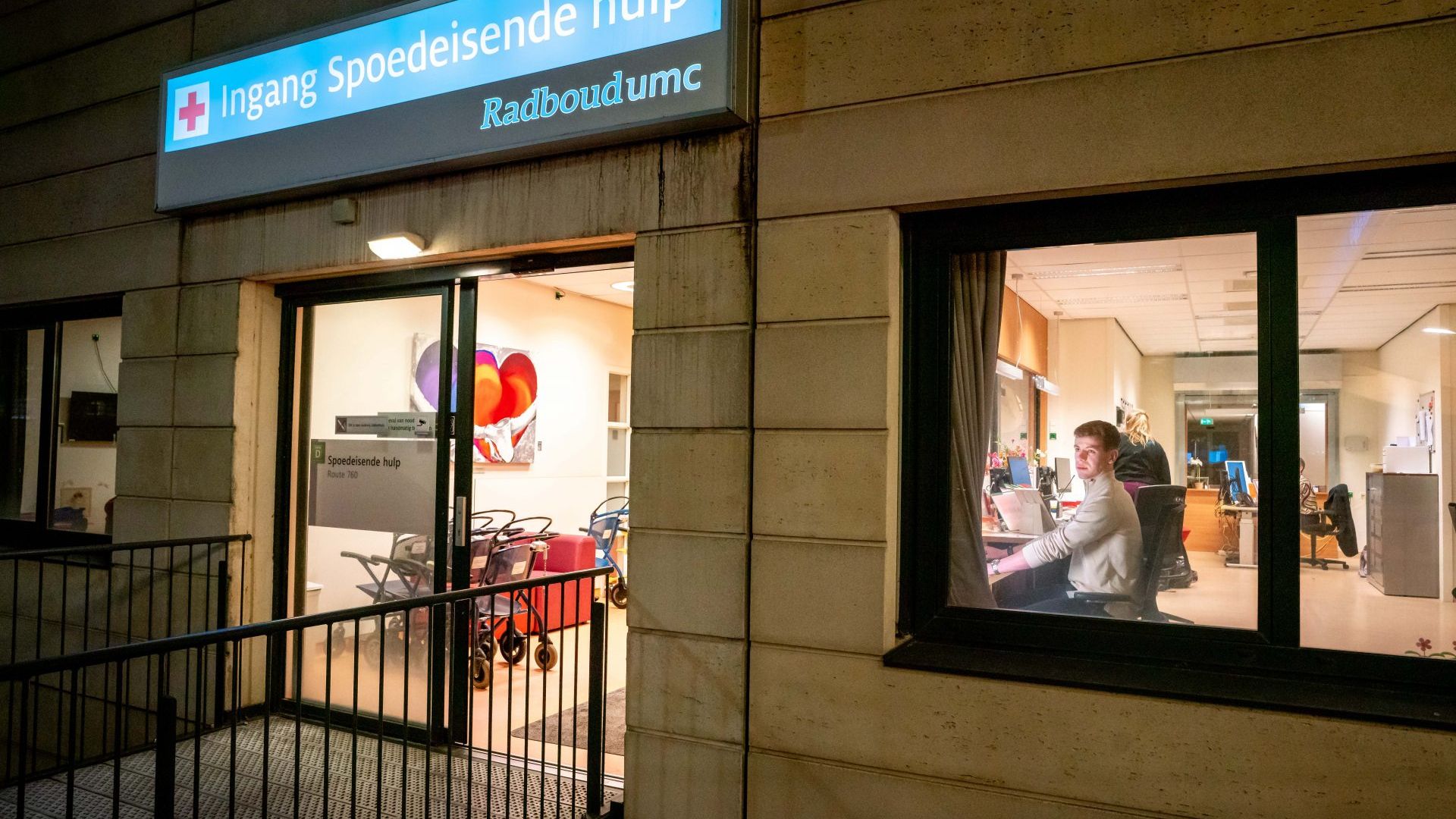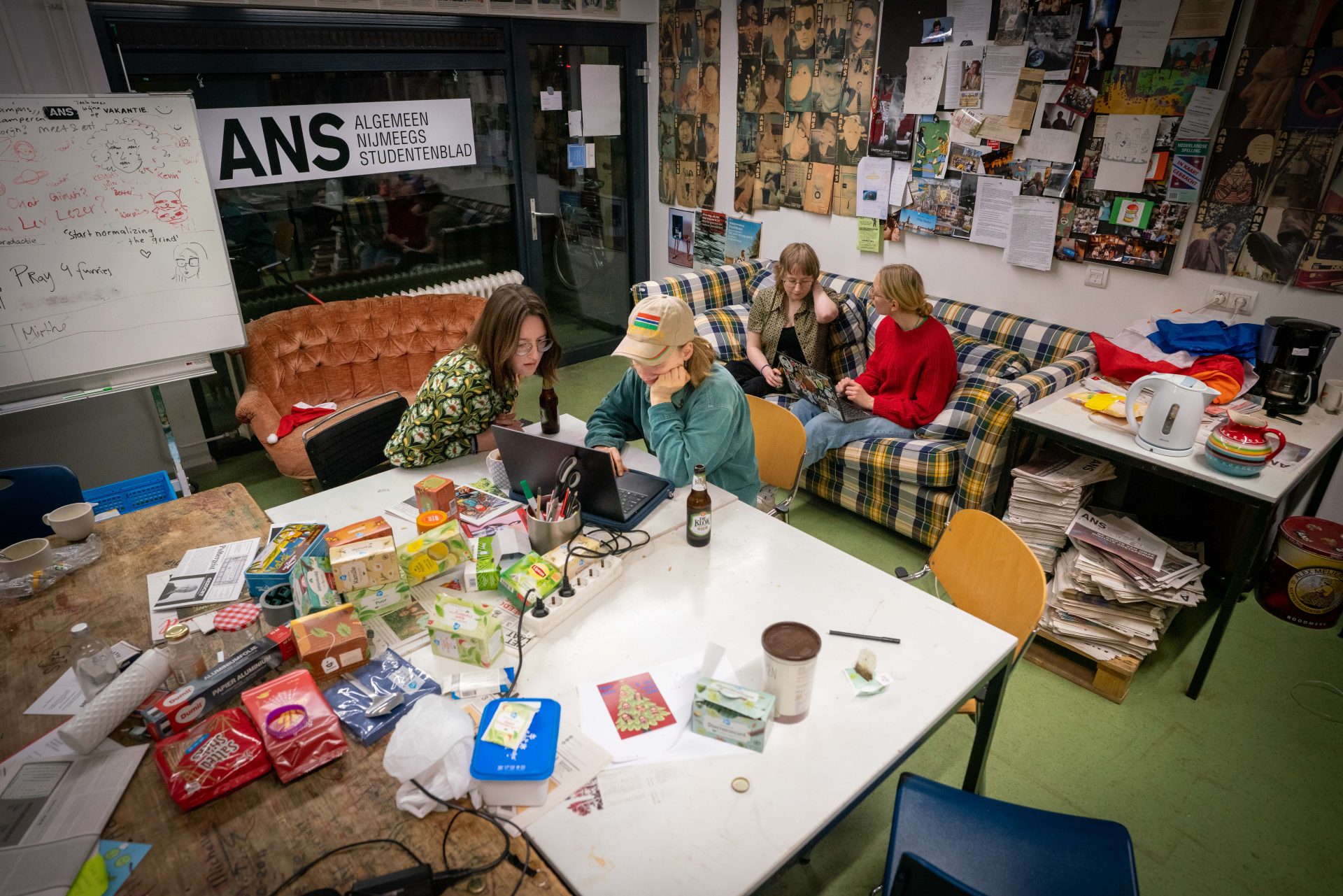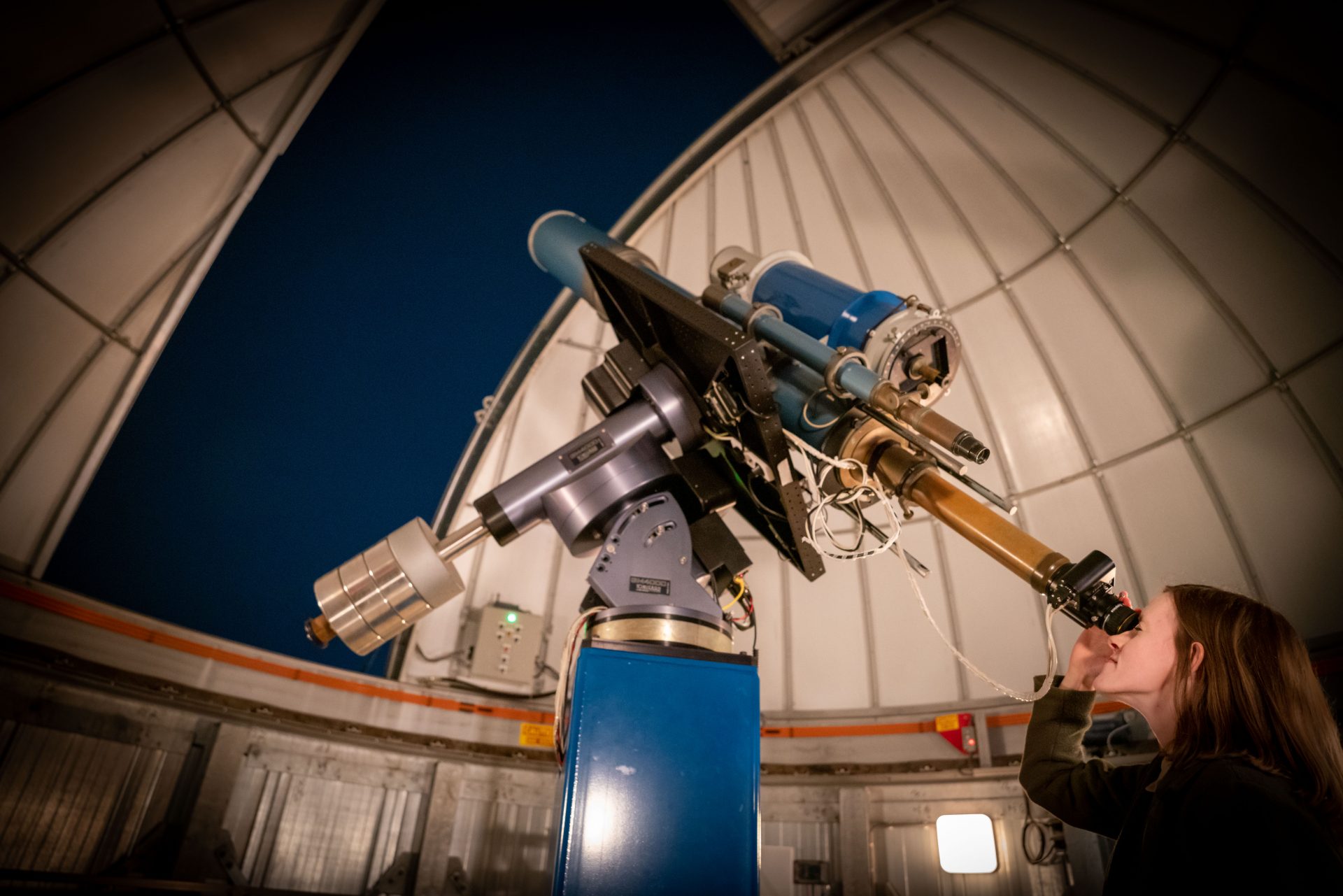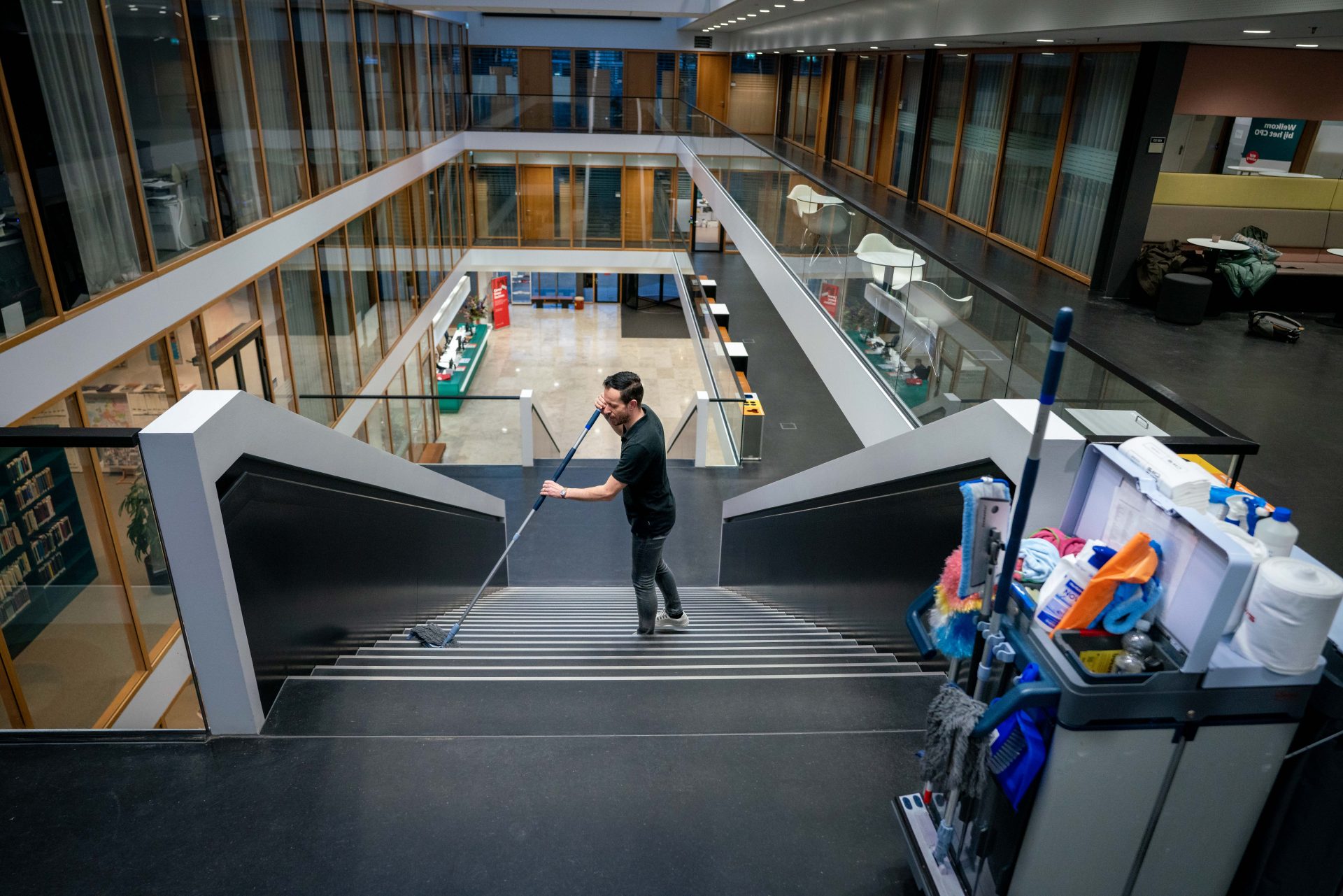These night owls are working on campus while you’re in bed
-
 Stein van der Wielen behind the reception desk of the ER. Photo: Erik van 't Hullenaar
Stein van der Wielen behind the reception desk of the ER. Photo: Erik van 't Hullenaar
During the day, the university campus is buzzing with students and employees. Most of them are spending their nights asleep in a comfortable bed – or at a party in the club. But the campus is never entirely abandoned. There is always someone working into the late or early hours. Vox paid a visit to four of these night owls.
Who: Stijn van der Wielen
Task: Receptionist in the Emergency Room
Where: Radboudumc
Healthcare never stops. Also at night, people get sick or accidents happen. In the Emergency Room (ER) of the Radboudumc, people are working all night long. Medical student Stijn van der Wielen (21) works a night shift behind the reception desk weekly.
‘I am the first point of contact for patients who come to the emergency room themselves or call with complaints,’ tells the medical student from behind his desk. ‘I perform an initial, brief triage (patient assessment, ed.) and enter everything into the system correctly so that the doctors are well prepared and know what to expect. Additionally, I ensure that patients who are transferred from the ER to another department are properly registered in the system.’
And that is important work, he explains. Because quick action is – especially in cases of serious injury – vital. ‘For example, if an ambulance arrives, it is essential that I enter everything into the system beforehand, so that various tests and scans can already be requested. In the case of a neurological trauma, for example, a whole team is ready to receive the patient here.’
‘Quick action is vital’
While Van der Wielen is telling his story, a patient approaches the reception desk. After checking some details, the man is allowed to take a seat in the waiting room. Night shifts in the emergency room start at eleven PM and last until eight o’clock the next morning. Medical students work the shifts. ‘It’s a perfect way to gain practical experience in the field.’
‘In the first years of the programme, you don’t have much contact with patients, or only in group settings. But you do have that here, of course. Additionally, I consult with doctors frequently when I have doubts about something. That is incredibly educational.’
He has no trouble with night shifts, except for some red eyes in the morning. The hours with few patients are filled with administrative tasks – or, if those are completed, with studying or watching a series. ‘Working multiple shifts per week is not ideal; it disrupts your sleep pattern.’
A man walks out of the waiting room. He is allowed to go home, and Van der Wielen is asked to arrange for a taxi. ‘Of course, sir, please sit down in the waiting room, I will make the call for you.’ That’s also part of the job – ensuring that people get home safely.

Who: Maan Heijthuijsen and Isis Okker
Task: ANS editorial team
Where: The Ondergang (Elinor Ostrom building)
It’s pitch dark in the Ondergang of the Elinor Ostrom building. After midnight, the office of ANS, the General Nijmegen Student Paper (tr.), is the only room where the light is still on. ‘It’s always great fun. But sometimes I do wonder what I’m doing here, at one o’clock in the morning, with no end in sight,’ says editor Maan Heijthuijsen (21), referring to the notorious deadline nights that the student paper holds once every six weeks.
During those evenings, the next ANS paper is put together. The students edit each other’s pieces. ‘For each paper, we need two evening shifts,’ explains editor Isis Okker (21). ‘On the first evening, we just go home at eleven thirty PM, regardless of how far we’ve progressed. The second deadline night gets really tough, though, because it doesn’t end until the paper is finished. Previous editorial teams used to go out into the city after they were done, but as long as I’ve been here, we’ve never finished before four o’clock in the morning.’
Why not ‘just’ work towards a deadline during the day, you might ask. Unfortunately, that’s not an option, according to Heijthuijsen. During the day, the students are busy with their studies and work, so working at night is necessary. And yet, the editorial team members admit, they could probably avoid the night shifts by having a tighter schedule.
‘The night doesn’t end until the paper is truly finished’
But suffering together also has its charm. Okker: ‘At times, it’s difficult to push through, but it creates a bond. There are regularly other employees stopping by who have nothing to do with the articles that still need to be finished. For the companionship and for the mental support.’
The collective suffering is alleviated by very much-needed snacks and the occasional sip of beer. Drinking in moderation is the motto. ‘We know that we’ll only have to stay longer if we’re tipsy,’ says Okker.
They haven’t encountered the cleaners, who usually start around six o’clock in the morning, yet after a whole night of working. It hasn’t gotten that late (or early). Although the couch in the office has been used as a bed. ‘One of our employees couldn’t access his bike last time because the bicycle storage under the building was closed, so he had to stay here overnight to make it to his class the next morning.’

Who: Daniëlle Pieterse, PhD candidate
Task: Telescope manager
Where: Huygens building
With a deafening noise, the top of the dome begins to move. After a few seconds, a hatch opens and the sky becomes visible. The telescope at the center of the dome starts to rotate. When you look through the lens, you can see hundreds of stars.
At least on clear nights. Unfortunately, the clouds are spoiling the view on this winter evening. However, this doesn’t dampen the enthusiasm of PhD student Daniëlle Pieterse (29) from the Astrophysics department, as she talks about the telescopes on top of the Huygens building.
‘The oldest telescope dates back to 1905,’ she proudly explains. ‘It’s like a museum piece, but with some modern components. To focus, you have to manually slide the tube in and out. The other telescope is much more modern and works with rotary knobs. Both devices are mounted on a tripod that automatically compensates for the rotation of the Earth, making it easy to focus on a single point.’
On the south side of the building, there are two optical telescopes, one with a lens and one that works with mirrors. On the north side, there are two radio telescopes, which operate using radio waves. The latter are currently under repair.
As the administrator, Pieterse is responsible for the large space viewers and guides people in the domes. Open evenings and telescope use lessons are always held in the evening because, logically, the starry sky is not visible during the day. ‘And I wouldn’t recommend staring towards the sun through a telescope during the day, you’d go blind immediately.’
Research is no longer conducted with the telescopes. ‘They are mainly used for public activities and for students to practice with. There is too much light pollution in Nijmegen for research. To study the sky properly, you want to be in the darkest environment possible, in the middle of nowhere. Preferably also on top of a mountain.’ That’s why Radboud scientists use telescopes in places like South Africa and Chile for their research, which they can control from a distance.
‘I do feel very small at times, here on Earth’
For her own research, Pieterse studies – in essence – how certain stars collide with each other. When this happens, a bright flash of light is visible in the sky. ‘But that collision has already taken place millions of light-years away, so you are essentially looking back in time.’
She pauses for a moment. ‘When you realize that the Erasmus Tower is 88 meters high, and I am staring into space millions of light-years away from that building, then I do feel very small at times, here on Earth.’

Who: Jeffrey Kobussen (35)
Task: Cleaner (Asito)
Where: Grotius building
For someone who calls himself ‘not a morning person,’ the alarm clock goes off quite early every morning: at five o’clock. While the rest of Nijmegen is still asleep, Jeffrey Kobussen prepares himself some breakfast and smokes his first cigarette. An hour later, his workday at the university begins.
‘That way I can wake up peacefully,’ he says. No one gets in his way, and if he were to grumble, only the vacuum cleaner would offer a listening ear.
Kobussen, born and raised in Nijmegen, has been working as a cleaner at the university for nine years. In recent years, the Grotius building has been his territory. He loves to see the building come to life in the morning. ‘It goes from being dead silent to three hundred students and employees walking around here,’ he says in the still-deserted coffee corner on the second floor.
‘I not only find happiness in this building but also in everyone who works here’
He cleans the toilets, mops the corridors, and ensures that the large lecture hall is spotless again. Then come the offices of the employees. By that time, he is cheerful and ready for a chat. ‘After so many years, I know the people here well. I not only find happiness in this building but also in everyone who works here.’
At Christmas, he receives cards with his name on them and a chocolate letter on December 5th. When he has been on vacation, they almost cheerfully await his return at the Grotius building. That gratitude is the engine for him to do his job well. ‘I am very perfectionistic.’
Yes, even at his home in Hatert, everything is neat. Kobussen loves ‘bling bling’ and crystal and high-gloss materials. That’s only beautiful when it’s polished. There must be no hairs from the Chihuahua, the Scottish Collie, or the cat flying around. He also takes care of his horse with great dedication. ‘We train five days a week. I compete in dressage competitions with her.’
He lost his wild hair – Kobussen was a hairdresser in a previous life – a few years ago. So, going to bed at half past nine in the evening is no punishment at all.



